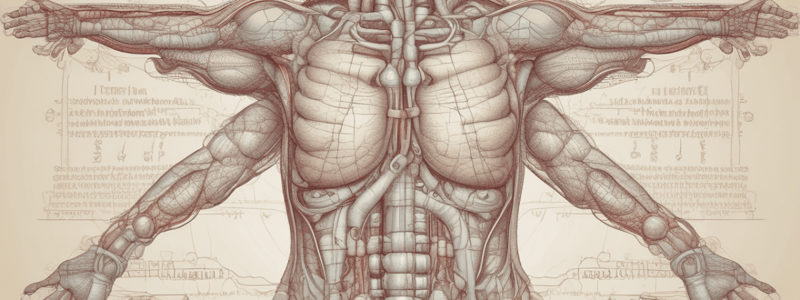Podcast
Questions and Answers
What is the primary role of thyroid hormones T3 and T4?
What is the primary role of thyroid hormones T3 and T4?
- Enhancing immune function
- Roles: • Metabolic rate and heat production • Oxygen consumption • Fat, carbohydrate & lipid metabolism • Growth and development • Brain function • Stimulated by TSH from the anterior pituitary gland • Thyroid must have iodine to produce these hormones (correct)
- Promoting bone growth
- Regulating blood pressure
Which hormone inhibits the resorption of calcium and phosphate in the body?
Which hormone inhibits the resorption of calcium and phosphate in the body?
- Calcitonin...........................................nhibits resorption of calcium & phosphate • Lowers serum calcium levels by retaining calcium/phosphate in the bones • Stimulated with hypercalcemia (correct)
- TSH
- Thyroxine
- Parathyroid Hormone (PTH)
What is a common cause of goiter?
What is a common cause of goiter?
- Overproduction of parathyroid hormone (PTH)
- Enlarged thyroid gland Entire gland or multiple nodules Can be associated with hyperthyroidism, hypothyroidism, or euthyroid state Causes: Lack of iodine in the diet Overproduction or underproduction of thyroid hormones Nodules in gland Medications containing thyroid-inhibiting substances (correct)
- Lack of calcium in the diet
- Low levels of thyroid hormones
What are signs and symptoms of goiter
What are signs and symptoms of goiter
What is treatment for a goiter?
What is treatment for a goiter?
How should levothyroxine be administered for the treatment of hypothyroidism?(Levothyroxine can produce nearly normal levels of both T3 & T4) Synthoid
How should levothyroxine be administered for the treatment of hypothyroidism?(Levothyroxine can produce nearly normal levels of both T3 & T4) Synthoid
What is hypothyroidism
What is hypothyroidism
What is primary hypothyroidism.........Hint: In primary thyroid disease, T3/T4 & TSH are going in opposite directions
What is primary hypothyroidism.........Hint: In primary thyroid disease, T3/T4 & TSH are going in opposite directions
What is secondary hypothyroidism................................In secondary thyroid disease, T3/T4 & TSH are going in the same direction
What is secondary hypothyroidism................................In secondary thyroid disease, T3/T4 & TSH are going in the same direction
What are signs and symtoms for hypothyroidism
What are signs and symtoms for hypothyroidism
What is a hypothyroidism treatment medication?
What is a hypothyroidism treatment medication?
What is hashimotos disease
What is hashimotos disease
In Myxedema Coma, which of the following symptoms are typically observed?
In Myxedema Coma, which of the following symptoms are typically observed?
What is the main cause of Myxedema Coma in patients with long-standing undiagnosed hypothyroidism?..............................acial puffiness, facial & periorbital edema,
edema of hands and feet
What is the main cause of Myxedema Coma in patients with long-standing undiagnosed hypothyroidism?..............................acial puffiness, facial & periorbital edema, edema of hands and feet
Which nursing intervention is crucial for patients with Myxedema Coma?
Which nursing intervention is crucial for patients with Myxedema Coma?
What is hyperthyroidism
What is hyperthyroidism
What is primary hyperthyroidism......................Hint: In primary thyroid disease,
T3/T4 & TSH are going in opposite directions
What is primary hyperthyroidism......................Hint: In primary thyroid disease, T3/T4 & TSH are going in opposite directions
what is secondary hyperthyroidism.................In secondary thyroid disease, T3/T4
& TSH are going in the same direction
what is secondary hyperthyroidism.................In secondary thyroid disease, T3/T4 & TSH are going in the same direction
Hyperthroidism pathos and etiology
Hyperthroidism pathos and etiology
What are hyperthyroidism signs and symptoms
What are hyperthyroidism signs and symptoms
What are nursing care and clinical manifestations for hyperthyroidism
What are nursing care and clinical manifestations for hyperthyroidism
What are hyperthyroidism interventions
What are hyperthyroidism interventions
What is radioactive Idone therpay for Hyperthyroidism
What is radioactive Idone therpay for Hyperthyroidism
What is antithyroid agent(methimazole, tapazole) given daily PO for hyperthyroidism
What is antithyroid agent(methimazole, tapazole) given daily PO for hyperthyroidism
What are thioamides(proplithioracil, prpyl-thyracil) taken 2-3 times a day
What are thioamides(proplithioracil, prpyl-thyracil) taken 2-3 times a day
What is a life-threatening emergency condition characterized by extreme tachycardia, hypertension, hyperthermia, and seizures?
What is a life-threatening emergency condition characterized by extreme tachycardia, hypertension, hyperthermia, and seizures?
Which are signs and symptoms of Thyrotoxic Crisis/Thyroid Storm?
Which are signs and symptoms of Thyrotoxic Crisis/Thyroid Storm?
How do you manage and treat thyroid storm
How do you manage and treat thyroid storm
What is thyroidectomy pre-op care
What is thyroidectomy pre-op care
What is post-op care for thyroidectomy
What is post-op care for thyroidectomy
What is the most common etiology of hyperparathyroidism?
What is the most common etiology of hyperparathyroidism?
Which of the following diagnostic tests are typically used for hyperparathyroidism?
Which of the following diagnostic tests are typically used for hyperparathyroidism?
What symptom are commonly associated with hyperparathyroidism?
What symptom are commonly associated with hyperparathyroidism?
What is the most effective treatment for hyperparathyroidism?
What is the most effective treatment for hyperparathyroidism?
What is a potential complication post-parathyroidectomy that requires immediate nursing intervention?
What is a potential complication post-parathyroidectomy that requires immediate nursing intervention?
What is a common emergency intervention for tetany due to hypoparathyroidism?
What is a common emergency intervention for tetany due to hypoparathyroidism?
What long-term dietary management is recommended for patients with hypoparathyroidism?
What long-term dietary management is recommended for patients with hypoparathyroidism?
Which sign is considered normal post-op and not indicative of hypoparathyroidism?
Which sign is considered normal post-op and not indicative of hypoparathyroidism?
In hypoparathyroidism, what should be avoided in terms of drug therapy?
In hypoparathyroidism, what should be avoided in terms of drug therapy?
What is a key aspect of long-term care for hypoparathyroidism patients?
What is a key aspect of long-term care for hypoparathyroidism patients?
Flashcards are hidden until you start studying




